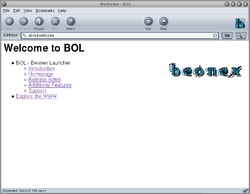
Galeon is a discontinued Gecko-based web browser that was created by Marco Pesenti Gritti with the goal of delivering a consistent browsing experience to GNOME desktop environment. It gained some popularity in the early 2000s due to its speed, flexibility in configuration and features.
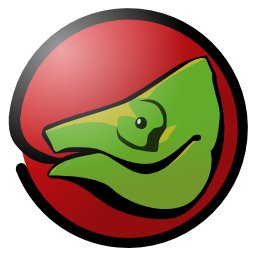
K-Meleon is a free and open-source, lightweight web browser for Microsoft Windows operating systems. Unlike cross-platform browsers, it uses the native Windows API to create its user interface. Early versions of K-Meleon render web pages with Gecko, Mozilla's browser layout engine, which Mozilla's browser Firefox and its email client Thunderbird also use. K-Meleon became a popular Windows browser and was available as an optional default browser in Europe via BrowserChoice.eu. K-Meleon continued to use Gecko for several years after Mozilla deprecated embedding it. Current versions of K-Meleon use the Goanna layout engine, a fork of Gecko created for the browser Pale Moon.
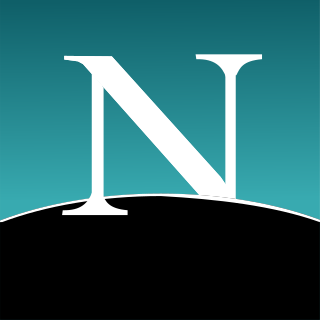
Netscape Navigator is a discontinued proprietary web browser, and the original browser of the Netscape line, from versions 1 to 4.08, and 9.x. It was the flagship product of the Netscape Communications Corp and was the dominant web browser in terms of usage share in the 1990s, but by around 2003 its user base had all but disappeared. This was partly because the Netscape Corporation did not sustain Netscape Navigator's technical innovation in the late 1990s.
Netscape Communications Corporation was an American independent computer services company with headquarters in Mountain View, California, and then Dulles, Virginia. Its Netscape web browser was once dominant but lost to Internet Explorer and other competitors in the so-called first browser war, with its market share falling from more than 90 percent in the mid-1990s to less than one percent in 2006. An early Netscape employee Brendan Eich created the JavaScript programming language, the most widely used language for client-side scripting of web pages and a founding engineer of Netscape Lou Montulli created HTTP cookies. The company also developed SSL which was used for securing online communications before its successor TLS took over.
Gecko is a browser engine developed by Mozilla. It is used in the Firefox browser, the Thunderbird email client, and many other projects.

ChatZilla is an IRC client that is part of SeaMonkey. It was previously an extension for Mozilla-based browsers such as Firefox, introduced in 2000. It is cross-platform open source software which has been noted for its consistent appearance across platforms, CSS appearance customization and scripting.

Netscape Communicator is a discontinued Internet suite produced by Netscape Communications Corporation, and was the fourth major release in the Netscape line of browsers. It was first in beta in 1996 and was released in June 1997. Netscape Communicator addressed the problem of Netscape Navigator 3.x being used as both the name of the suite and the browser contained within it by renaming the suite to Netscape Communicator. It included more groupware features intended to appeal to enterprises.
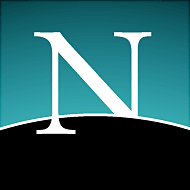
Netscape 6 is a discontinued Internet suite developed by Netscape Communications Corporation, and was the sixth major release of the Netscape series of browsers. It superseded Netscape Communicator (4.x), as the release of Netscape Communicator 5 was scrapped. Netscape 6 was the first browser of the Netscape line to be based on another source code: Mozilla Application Suite, an open-source software package from the Mozilla Foundation, which was created by Netscape in 1998.

fli4l is a Linux distribution, actively developed by German developers since 2000. The projects main task is to provide a small Linux system that turns almost every machine into a router. The distribution can run from a floppy disk and was created with the aim of simple configuration and support for older hardware.

SeaMonkey is a free and open-source Internet suite. It is the continuation of the former Mozilla Application Suite, based on the same source code, which itself grew out of Netscape Communicator and formed the base of Netscape 6 and Netscape 7.
The history of the Mozilla Application Suite began with the release of the source code of the Netscape suite as an open source project. Going through years of hard work, Mozilla 1.0 was eventually released on June 5, 2002. Its backend code base, most notably the Gecko layout engine, has become the foundation of a number of applications based on Mozilla, including the Mozilla Foundation's flagship product Mozilla Firefox and Mozilla Thunderbird. While the suite is no longer a formal Mozilla product, its development and maintenance is continued as the SeaMonkey community project.

The Mozilla Application Suite is a discontinued cross-platform integrated Internet suite. Its development was initiated by Netscape Communications Corporation, before their acquisition by AOL. It was based on the source code of Netscape Communicator. The development was spearheaded by the Mozilla Organization from 1998 to 2003, and by the Mozilla Foundation from 2003 to 2006.

Flock is a discontinued web browser that specialized in providing social networking and Web 2.0 facilities built into its user interface. Earlier versions of Flock used the Gecko HTML rendering engine by Mozilla. Version 2.6.2, released on January 27, 2011, was the last version based on Mozilla Firefox. Starting with version 3, Flock was based on Chromium and so used the WebKit rendering engine. Flock was available as a free download, and supported Microsoft Windows, Mac OS X and, at one time, Linux as well.

The Netscape web browser is the general name for a series of web browsers formerly produced by Netscape Communications Corporation, which eventually became a subsidiary of AOL. The original browser was once the dominant browser in terms of usage share, but as a result of the first browser war, it lost virtually all of its share to Internet Explorer due to Microsoft's anti-competitive bundling of Internet Explorer with Windows.

Netscape Navigator 9 is a discontinued web browser that was produced by the Netscape Communications division of parent AOL, first announced on January 23, 2007. It was the ninth major release of the Netscape line of browsers. After AOL outsourced the development of Netscape Browser 8 to Mercurial Communications in 2004, Netscape Navigator 9 marked the first Netscape browser to be produced in-house since the Netscape 7 suite. It also saw the return of the classic Navigator name, which was previously used during Netscape's heyday between versions 1.0 and 4.08 in the 1990s. Netscape Navigator 9 is based on Mozilla Firefox 2.0.
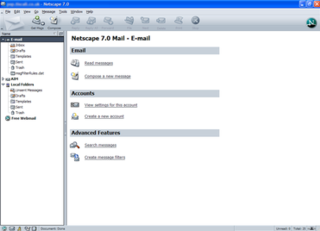
Netscape Mail and Newsgroups, commonly known as just Netscape Mail, was an email and news client produced by Netscape Communications Corporation as part of the Netscape series of suites between versions 2.0 to 7.2. In the 2.x and 3.x series, it was bundled with the web browser. In the 4.x series, it was rewritten as two separate programs known as Netscape Messenger and Netscape Collabra.
Bynari is a defunct company based in Dallas, developing server and email software, mainly known for its Insight Family, similar to Microsoft Exchange Server with Outlook.

Mozilla is a free software community founded in 1998 by members of Netscape. The Mozilla community uses, develops, publishes and supports Mozilla products, thereby promoting exclusively free software and open standards, with only minor exceptions. The community is supported institutionally by the non-profit Mozilla Foundation and its tax-paying subsidiary, the Mozilla Corporation.

